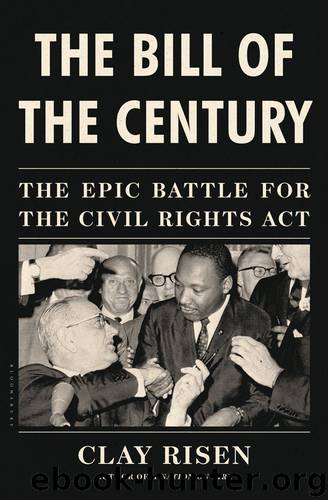The Bill of the Century: The Epic Battle for the Civil Rights Act by Risen Clay

Author:Risen, Clay [Risen, Clay]
Language: eng
Format: epub
Publisher: Bloomsbury Publishing
Published: 2014-04-01T00:00:00+00:00
On the morning of January 9, 1964, Chairman Smith gaveled to order the Rules Committee hearings on the civil rights bill. It was a cold yet humid morning—a particularly enervating climatic combination that Washington seems to excel in—and some fifty reporters, along with assorted onlookers and scores of House staff, crammed sweatily into the forty-five-seat Room H-313. The room was at the northern end of the Cannon House Office Building, a stunning neoclassical pile designed by Carrère and Hastings, the same firm that built the New York Public Library. Out its windows, behind Smith, the audience could see the equally imposing Library of Congress.41
The room felt like a sauna, but the real heat was on Smith: the night before, Johnson, in his first State of the Union address, had reiterated his call for rapid action on the bill. “Let this session of Congress be known as the session which did more for civil rights than the last hundred sessions combined,” the president had said at the very beginning of the speech.42
And yet Smith was not going to let the bill roll through his committee. He had opened the hearings as promised, but he did not say how long he would go before closing them. This was the man who had retreated to his 170-acre northern Virginia farm to delay hearings on the 1957 civil rights bill. He claimed a barn had caught fire, prompting Speaker Sam Rayburn to quip, “I knew Howard Smith would do most anything to block a civil rights bill, but I never knew would resort to arson.” If anyone expected the bill to now sail through the Rules Committee, they did not know Howard Smith.43
Smith called Celler as his first witness. “Mr. Celler,” he said, “there is a rumor around that you want to get a rule of H.R. 7152.”44
“I confirm the rumor,” Celler replied.
Smith, along with Brown, proceeded to grill Celler relentlessly for two days. It was not the Brooklynite’s finest hour. He offered vague, contradictory answers to questions about arcane but important details of the bill. He denied, against all evidence, supporting the parts of the subcommittee bill “which I felt were too drastic,” adding, “I personally did not agree to all terms of the subcommittee bill.” At one point Katherine St. George, a Republican from New York, leaned over to Smith and said, “You’ve got him pretty well tangled up.”
“I didn’t tangle him up,” Smith replied. “He tangled himself up. He just doesn’t know what’s in this bill.”45
Celler’s efforts at sympathy for the South came off as patronizing and careless. “I am not unaware of the price that must be paid for the advancement and the culmination of the cause of civil rights,” he said. “It is easy for myself and other Northerners to demand that some change their mores, their customs, wrench away from tradition, but it is like asking one to sever hand from wrist. I wish, truly, it could be otherwise, but unfortunately it cannot. The die is cast.”46
Most of Smith’s and Brown’s questions focused on the bill’s last few days before Celler’s committee.
Download
This site does not store any files on its server. We only index and link to content provided by other sites. Please contact the content providers to delete copyright contents if any and email us, we'll remove relevant links or contents immediately.
| Africa | Americas |
| Arctic & Antarctica | Asia |
| Australia & Oceania | Europe |
| Middle East | Russia |
| United States | World |
| Ancient Civilizations | Military |
| Historical Study & Educational Resources |
Cat's cradle by Kurt Vonnegut(13889)
Pimp by Iceberg Slim(12941)
Underground: A Human History of the Worlds Beneath Our Feet by Will Hunt(11264)
4 3 2 1: A Novel by Paul Auster(11072)
The Radium Girls by Kate Moore(10914)
American History Stories, Volume III (Yesterday's Classics) by Pratt Mara L(4828)
Perfect Rhythm by Jae(4628)
Wiseguy by Nicholas Pileggi(4598)
The Fire Next Time by James Baldwin(4349)
Paper Towns by Green John(4175)
A Higher Loyalty: Truth, Lies, and Leadership by James Comey(4038)
Pale Blue Dot by Carl Sagan(4015)
The Mayflower and the Pilgrims' New World by Nathaniel Philbrick(3917)
The Doomsday Machine by Daniel Ellsberg(3736)
Too Much and Not the Mood by Durga Chew-Bose(3698)
Killers of the Flower Moon: The Osage Murders and the Birth of the FBI by David Grann(3621)
The Borden Murders by Sarah Miller(3592)
The Sympathizer by Viet Thanh Nguyen(3508)
Killing England by Bill O'Reilly(3459)
